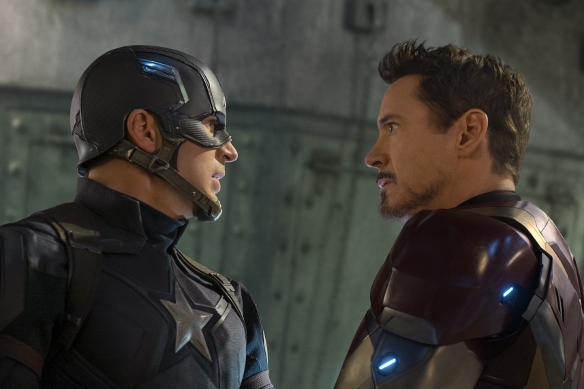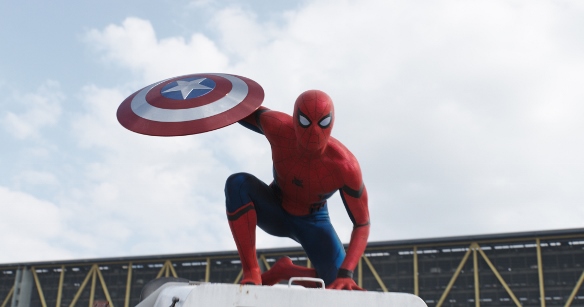
L to R: Captain America/Steve Rogers (Chris Evans) and Iron Man/Tony Stark (Robert Downey Jr.)
Ph: Zade Rosenthal
©Marvel 2016
Marvel has taken its heroes to the extreme, and emerged triumphant. Captain America: Civil War pits the Avengers against one another in an epic battle, divided in their response to an eternal dilemma, creating a taut, suspenseful, action-filled drama with the signature Marvel humor spiking the already intoxicating adrenaline rush.
Are superheroes good or evil? They do seem to spend a lot of their time wreaking havoc, and violence is their modus operandi. No one can deny that they fight bad guys, but what distinguishes them from the bad guys? What about all the harm that comes to innocent people when these gargantuan battles are waged? Aren’t the superheroes just as dangerous as the bad guys?
Marvel never forgets that the audience is human: in order to understand something, we need to make it personal. And they deliver. A mission in Lagos gone horribly wrong, resulting in many civilian deaths, ostensibly instigates the move to control the actions of the Avengers, via the Sokovia Accords, which place them under the supervision of the U.N. Yet it is a simple scene in the corridor, a casual encounter between Tony Stark (Robert Downey Jr.) and an anonymous woman – portrayed by the outstanding Alfre Woodard – that penetrates beyond the surface of the words ‘collateral damage’ to make us feel the pain. It’s just a small scene, yet replete with impact, creating the groundwork for the rift between Iron Man and Captain America.
The precisely written, multi layered script by Christopher Markus and Stephen McFeely, draws on the history of these characters as we have come to know them over several films, and lends depth to their words and actions as they develop further in this film. As viewers we care about these characters, what is even more remarkable is that the film successfully conveys the sense that they care about one another, even in the heat of battle. The intricate foreshadowing of events and their ultimate impact is clear in hindsight, while in viewing one experiences a swift pace and even flow of action, as the underlying tensions mount.

Spider-Man/Peter Parker (Tom Holland)
Photo Credit: Film Frame
© Marvel 2016
The stellar ensemble cast brings an emotional impact and weight even to the most loathsome or minor role. When William Hurt is Secretary of State, one can’t help but listen, even if his official political-speak is abhorrent. The additions to the cast are terrific! Paul Rudd brings a joyful exuberance to Ant Man, that brightens up this rather dark film, while Chadwick Boseman makes an intriguing Black Panther. Tom Holland’s nerdy, Spider-Man has a quirky charm to augment all those superhero powers that one sense he has not quite grown into… Tony Stark/Iron Man’s effervesence is somewhat more muted in this film, fewer wisecracks (with a few notable exceptions) and more inner turmoil, perhaps to balance Chris Evan’s rather stoic Captain America, evening up the playing field as the two heroes take on their opposing roles. Black Widow (Scarlett Johansson) kicks ass with elegance and panache, as ever, and Wanda (Elizabeth Olsen) is nicely coming into her own, and Vision (Paul Bettany) is delightfully other… and it’s all epic fun.
Captain America: Civil War
Directed by Anthony Russo, Joe Russo; Screenplay: Christopher Markus, Stephen McFeely; Cinematography: Trent Opaloch; Editing: Jeffrey Ford, Matthew Schmidt; Music: Henry Jackman; Cast: Chris Evans, Robert Downey Jr., Scarlett Johansson, Sebastian Stan, Anthony Mackie, Don Cheadle, Jeremy Renner, Chadwick Boseman, Paul Bettany, Elizabeth Olsen, Paul Rudd, Emily VanCamp, Tom Holland, Frank Grillo, William Hurt, Daniel Bruhl, Alfre Woodard.





